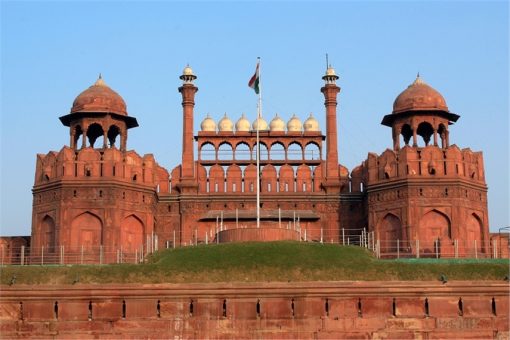The Indian people cherish their great heritage that exists in physical terms in its monuments as well as the huts and tools of ordinary men and women of the past. What remains from the past needs not only to be faithfully preserved, but also correctly interpreted.
The present regime in power has an unsavoury past in regard to our heritage. It felt no compunction when its followers destroyed a 450 years old monument of architectural importance in 1992 just because it was a mosque. The Rashtriya Swayamsevak Sangh has long been propagating the cause of declaring all major medieval monuments, including the Taj Mahal and Delhi’s Red Fort as Hindu structures.
It is, therefore, right that people should be perturbed when it is announced that the safekeeping of the historic Red Fort of Delhi from which India’s independence was proclaimed by Jawaharlal Nehru on 15 August 1947, and has always been a symbol of modern Indian nationalism since 1857 is being entrusted to a cement company, Dalmia Bharat with no known credentials in the work of architectural preservation or in heritage-management. It has been announced that they are expected to “construct landscape”, etc., and also maintain an “interpretation centre”.
It is surely a slur on the Archaeological Survey of India, the legal guardian of all monuments that it is held to be incapable of maintaining a major national monument like the Red Fort. But what is most troubling is the fear that a commercial company will try to cater to the kind of beliefs and prejudices the RSS and its followers represent in interpreting and then trifling with the structure of the Red Fort.
It is, therefore, essential that the agreement between the Government and Dalmia Bharat be rescinded, and the Red Fort, as well as all our major monuments be duly protected and preserved solely by the Archaeological Survey of India, to which the duty is assigned by the Protected Monuments Act, 1958.
|
Irfan Habib Vivan Sundaram Prabhat Patnaik Mushirul Hasan Mihir Bhattacharya Sashi Kumar Ram Rahman Anil Bhatti Geeta Kapur M. K. Raina Madangopal Singh
Sohail Hashmi Arjun Dev B.P. Sahu D. N. Jha Iqtidar Alam Khan K M Shrimali Lata Singh Prabhat Shukla R. C. Thakran Shireen Moosvi Suvira Jaiswal Vishwamohan Jha R. P. Bahuguna Rajesh Singh Kesavan Veluthat A. K. Sinha Shalin Jain H. C. Satyarthi V. Ramakrishna Ramakrishna Chatterjee Arun Bandopadhyaya S. Z. H. Jafri C. P. Chandrasekhar Vikas Rawal Indira Arjun Dev Zoya Hasan C. P. Bhambri Kanishka Prasad Vartika Chaturvedi Abha Dev Habib
|
Rakesh Batabyal Amiya Kumar Bagchi Rekha Awasthi Nadeem Rezavi M.M.P. Singh Ramesh Rawat Rajinder Arora Rajni Arora Amar Farooqui Aban Raza Badri Raina Sukumar Murlidharan Veer Munshi Anand K. Sahay Sukriti Ray
Saba Hasan Santosh Rai Hitendra Patel V.N. Sinha J.N. Sinha O.P. Jaiswal Najaj Hyder C.P.N. Sinha Dayanand Rai H.C. Satyarthi S.S. Seshan B.N.P. Singh S.N.R. Rizvi Sushanto Das Sanjay Sharma K.L. Tuteja Nagenra Sharma Nalini Taneja Asad Zaidi Arun Mishra Ranbir Singh Dahiya Wazir Singh Ghanghas Sitaram Singh Himanshu Joshi Anil Kumar Singh Aditi Chowdhury
|
Rakesh Manchanda Manoj Kulkarni Durgaprasad Agrawal Prasanna Kumar Roger Alexander Abul Kalam Azad Pattanam Chaman Lal Estelle Pereira Desai Girish Shrivastava Naresh Prerna Bhavna Sharma Ranbir Sinh Smita Gupta Vinod Bhooshan Abrol Frans Manjali Alok Bajpai Alka Bajpai Salim Saboowalla Aftab Alam Subhabrato Roy Kiran Shaheen Rakhshanda Jalil Moin Sattar Bindu Batra Nicky Chandam Atika Gupta S. Kalidas Ankit Agrawal Kausar Wizarat Ved Dhingra Sudhanshi Vasudev Jai Wokhloo Raj Kumar Hamid Ali Khan Munesh Tyagi Manmohan Mathew Varghese Rashmi Doraiswamy Saumya Baijal Jawed Nehal Avik Bose |





